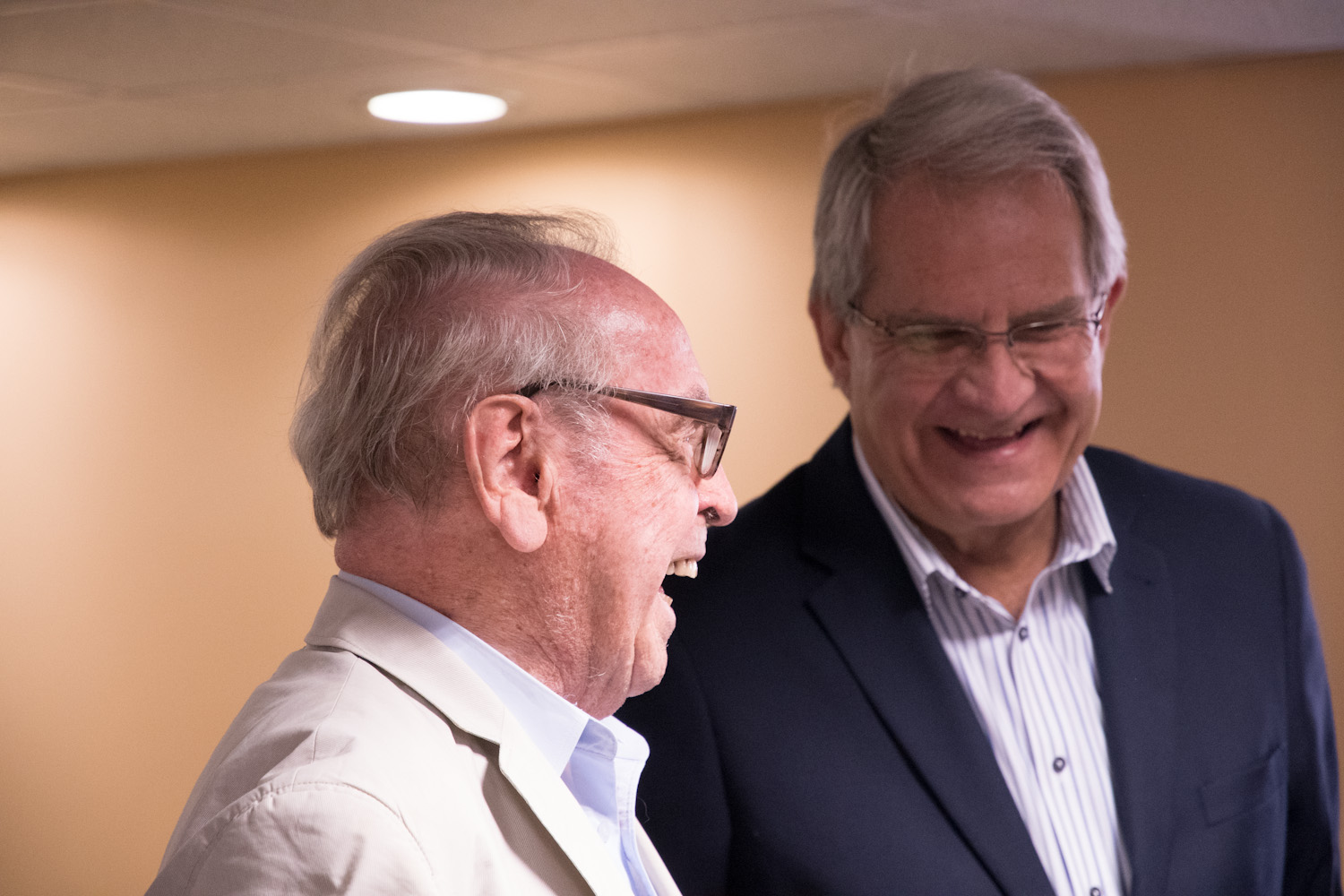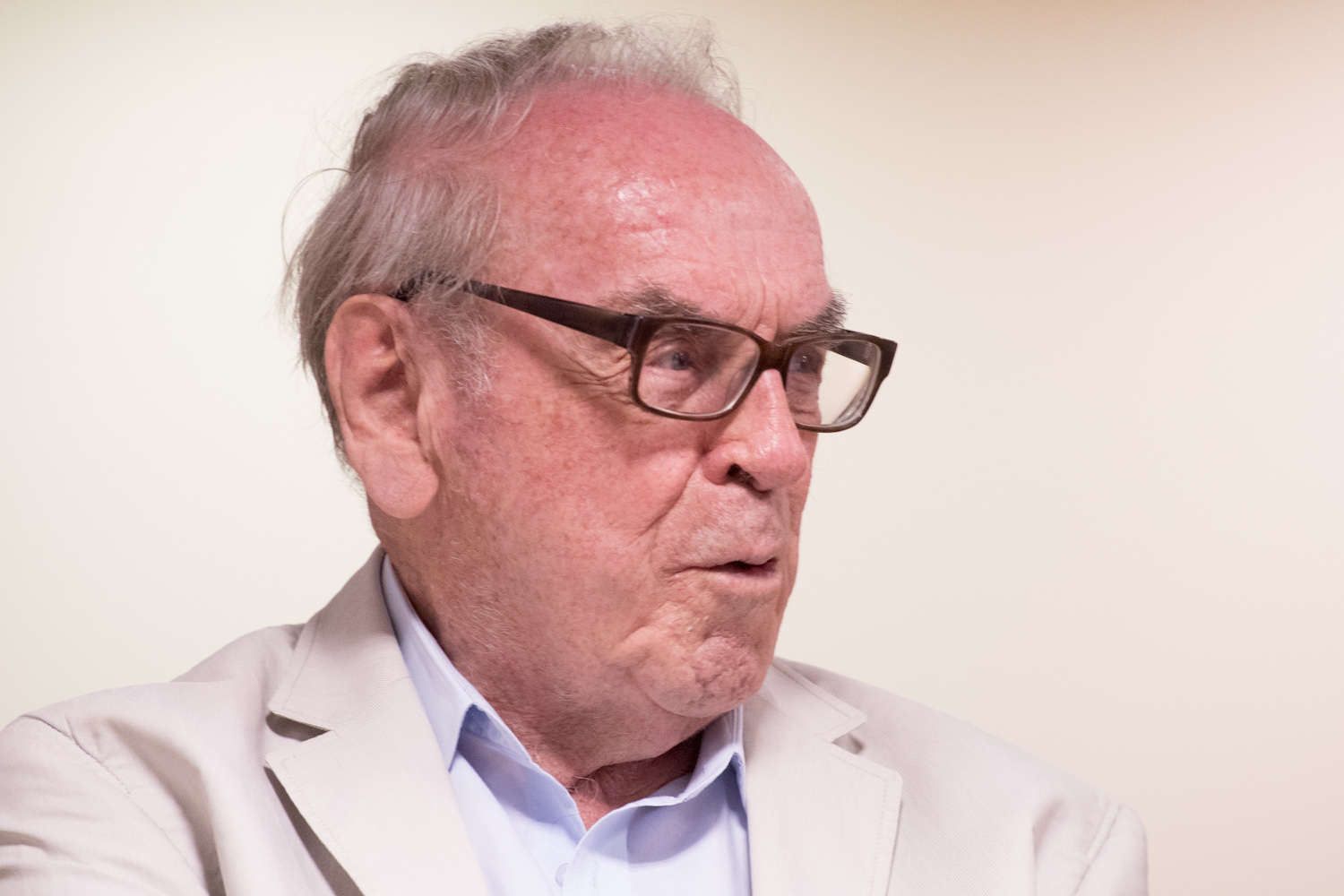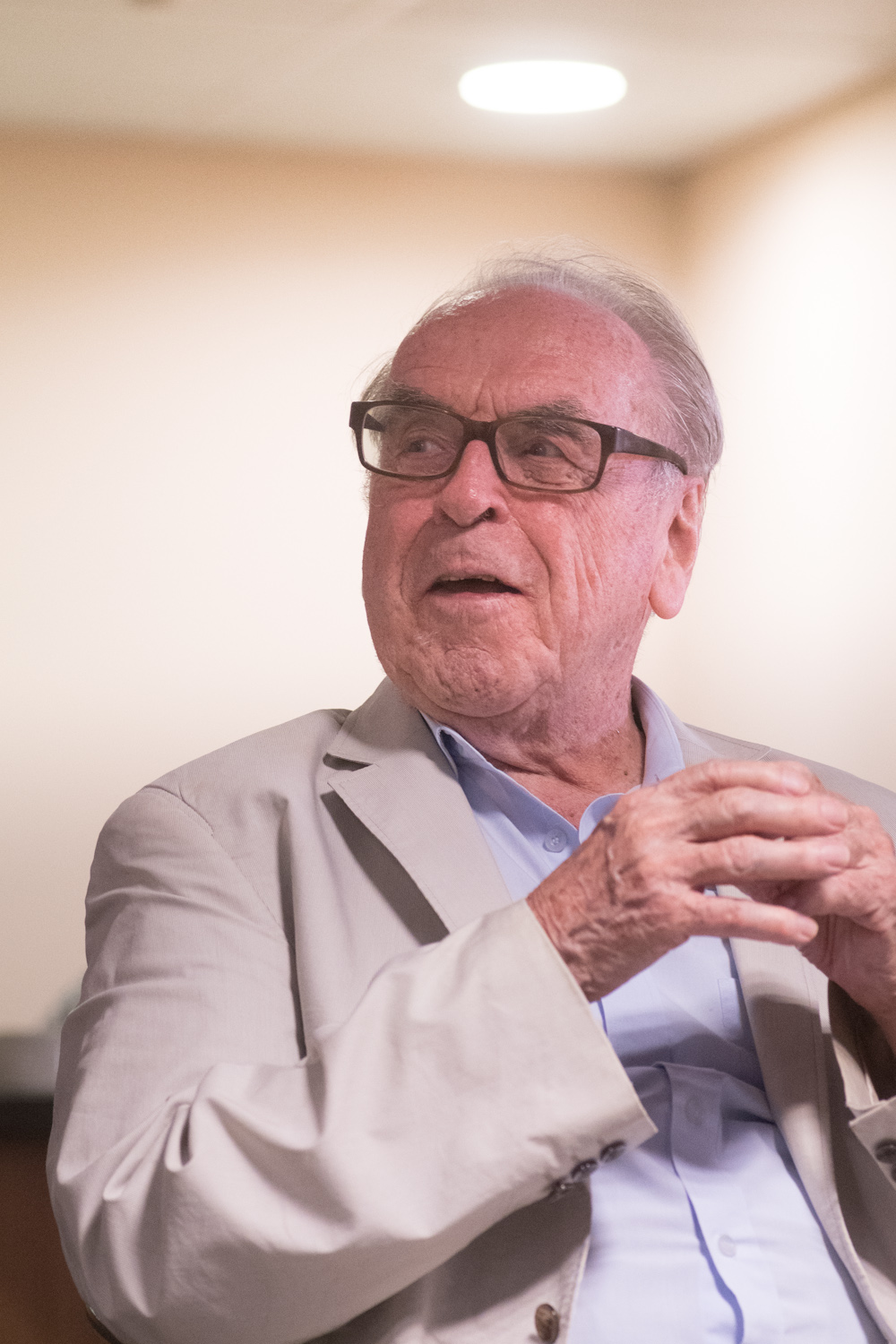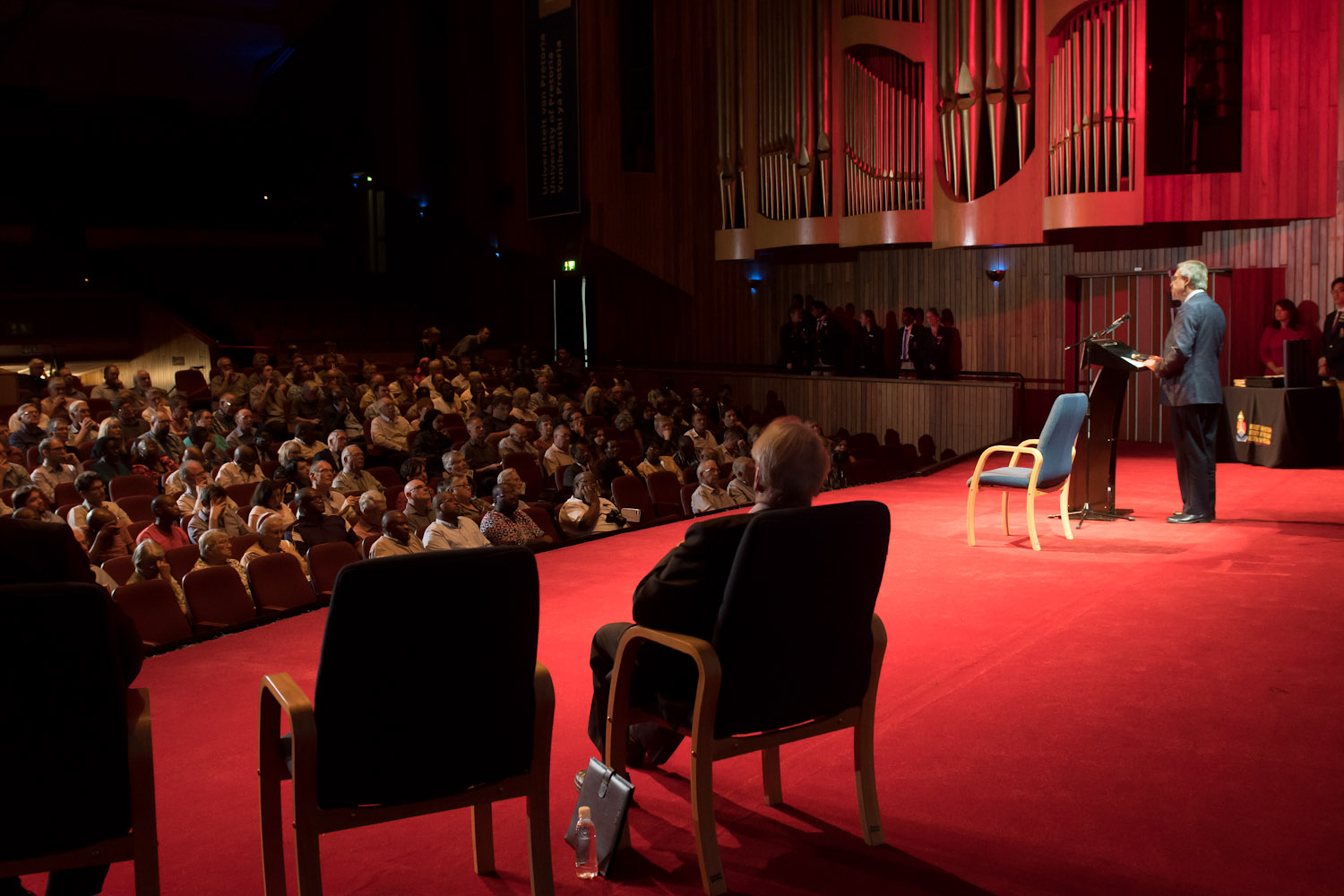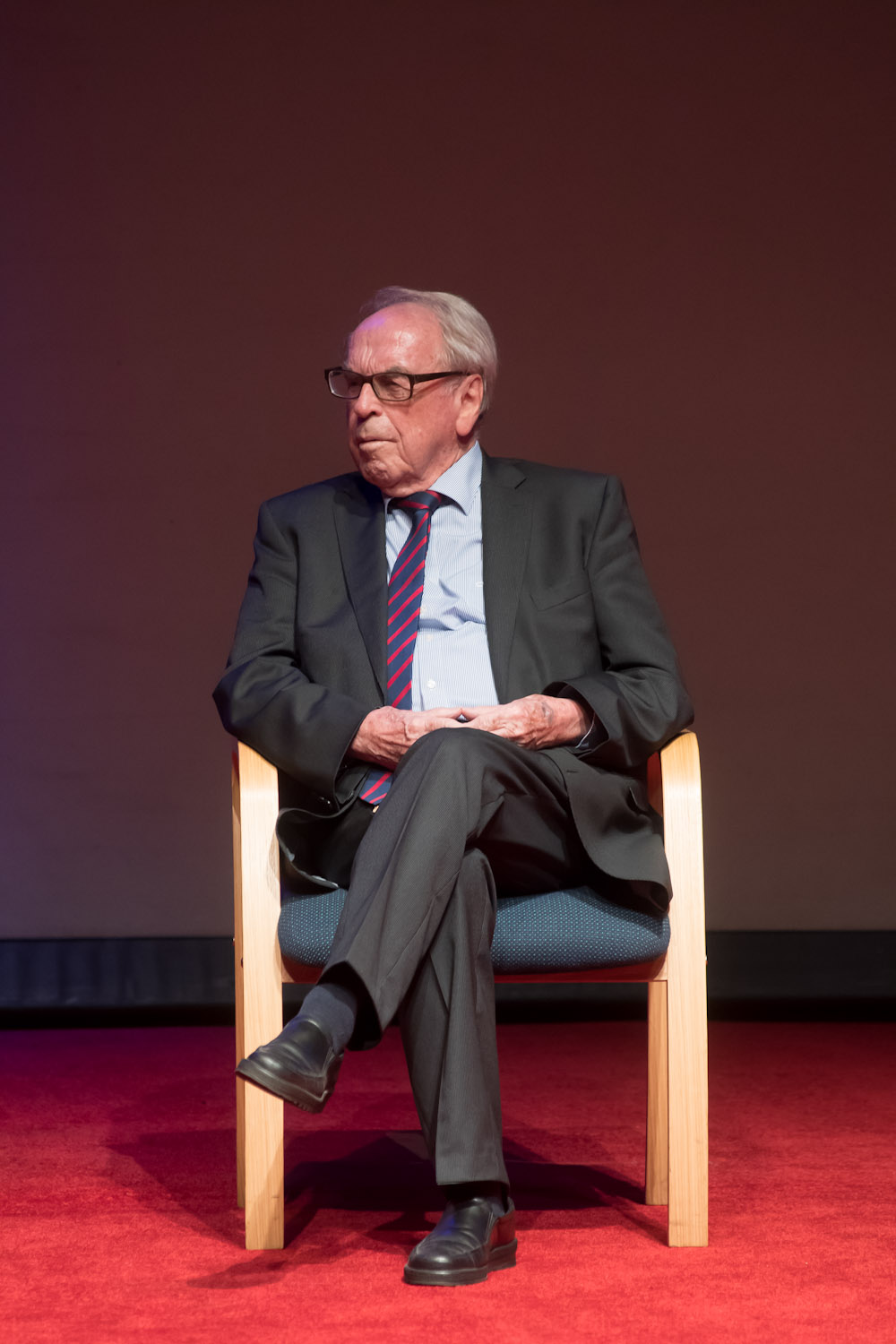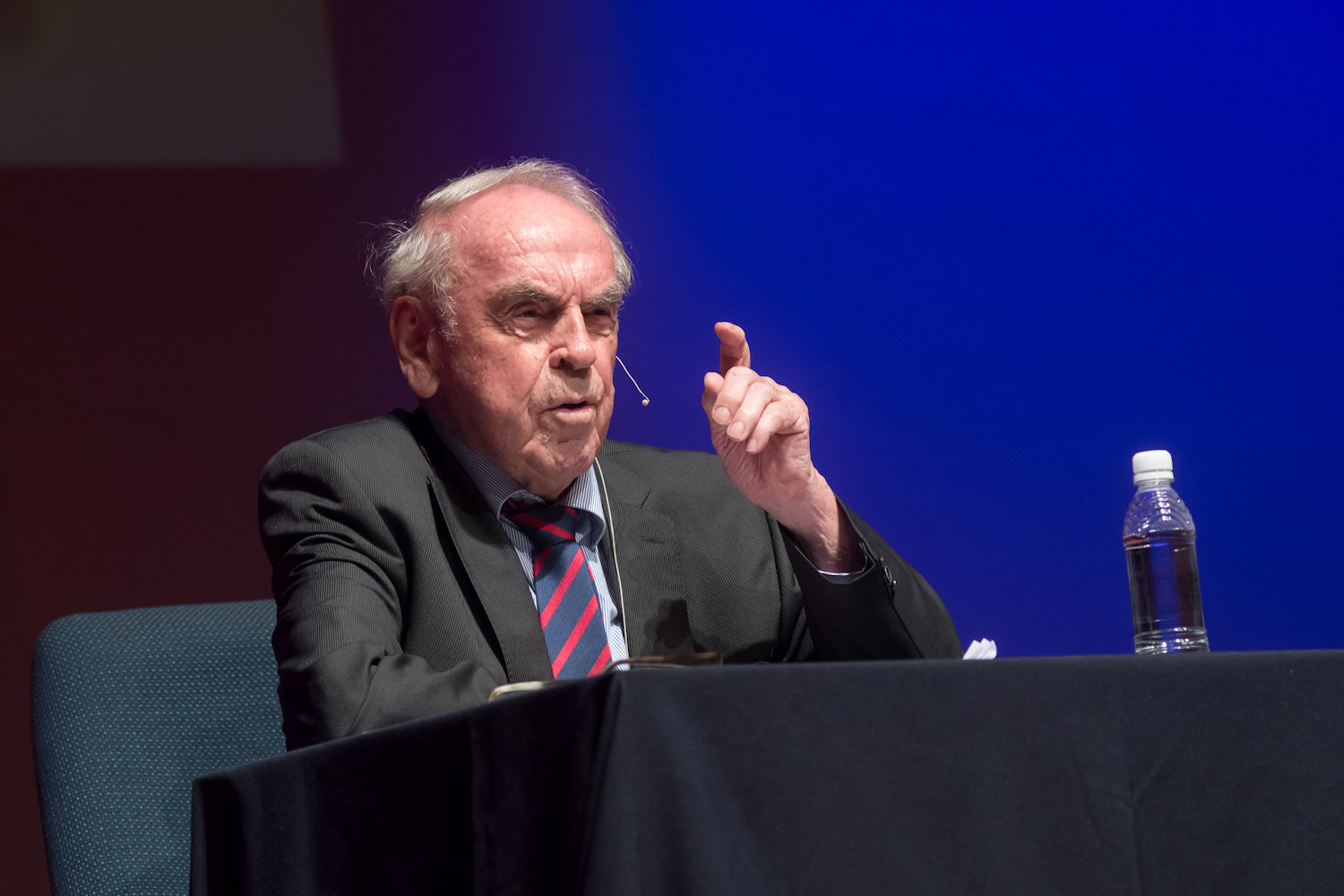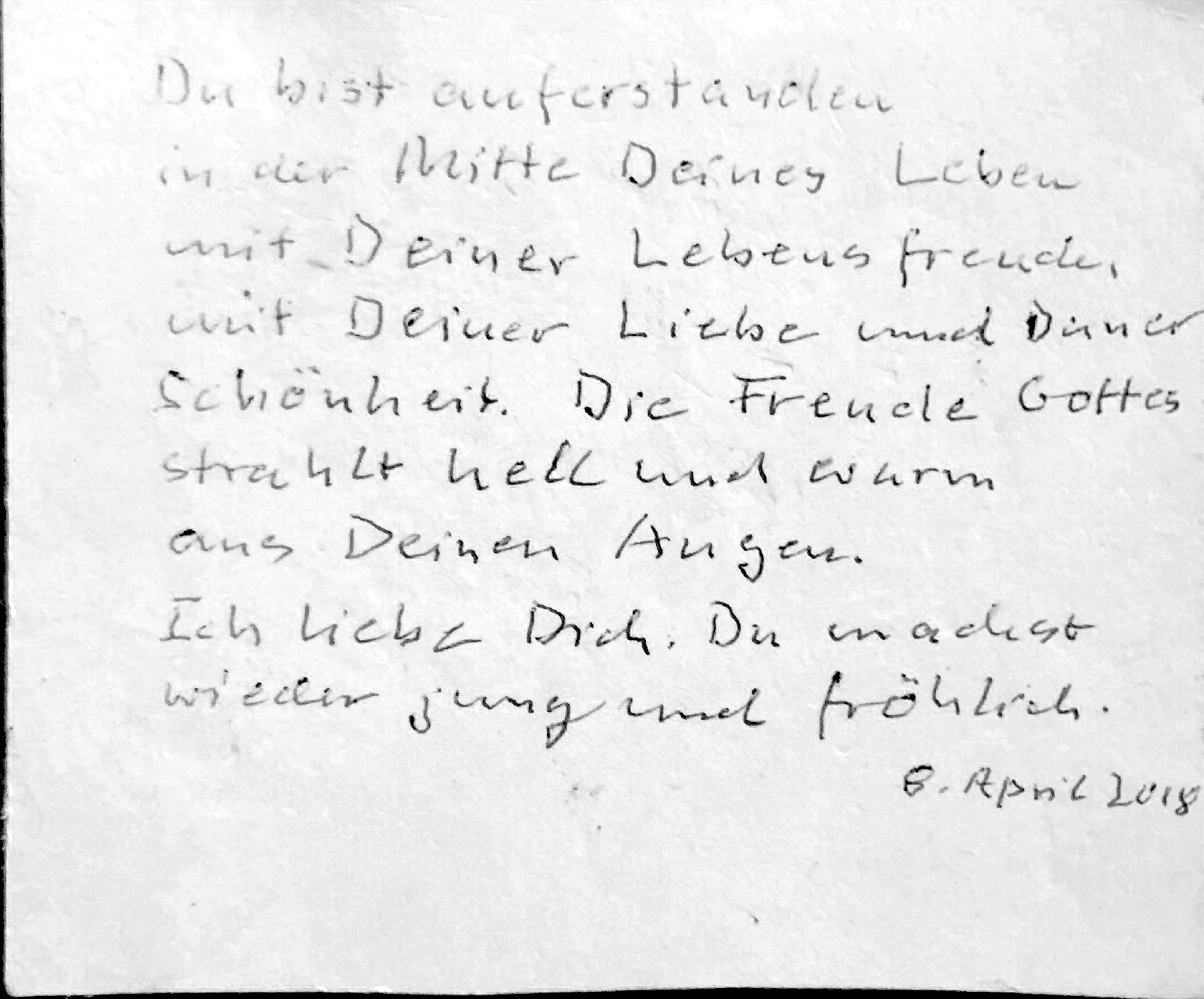With seminal works that hold close to life’s joys and sorrows, its triumphs and catastrophes, Moltmann reminded us of the life-altering and world-shaping power of God’s presence and love.
He continues to motivate readers, colleagues, and friends to live in faith, hope, and love in light of God’s life with us in Jesus Christ.
Miroslav Volf
Jürgen Moltmann
Jürgen Moltmann
Clay Risen
Jürgen Moltmann
This memorial page serves to remember and celebrate the life and works of theologian Jürgen Moltmann (1926–2024).
Please share your appreciation, memories, and photos of Dr. Moltmann on our growing message board.
Hosted by the Yale Center for Faith & Culture
Message Board
We invite you to share your memories, admiration, and appreciation of Jürgen Moltmann. Stories, reflections, photos, prayers, and gratitude are all welcome. Please be patient as your message is reviewed and posted.
No results found. Try searching again.
Thanks to Jürgen
Oft in den letzten Jahren wurde ich von Jürgen Moltmann zu einer Teestunde in sein Tübinger Haus eingeladen. Wir sprachen über Gott und die Welt, meistens aber über die Eschatologie, über unsere hoffnungsvolle Zukunft in Gottes Herrlichkeit. Er schreibt in seinem Hoffnungsbuch "With the resurrection of Christ, heaven is opened for the whole suffering creation." Und bei einer Teestunde sagte er zu mir: "Weißt Du, Gotthold, meine Todesstunde ist meine Auferstehungsstunde". Daran möchte ich mich halten. - Danke für Deine Herzlichkeit, für Deine Unterstützung, für Deine Erkenntnis, für Deinen Segen! Du wirkst weiter in meinem Herzen. Alle Deine Freunde wollen den Weg ins Reich Gottes gemeinsam weitergehen.
Gotthold Knecht, Publisher of denkhaus Verlag, Germany
Oft in den letzten Jahren wurde ich von Jürgen Moltmann zu einer Teestunde in sein Tübinger Haus eingeladen. Wir sprachen über Gott und die Welt, meistens aber über die Eschatologie, über unsere hoffnungsvolle Zukunft in Gottes Herrlichkeit. Er schreibt in seinem Hoffnungsbuch "With the resurrection of Christ, heaven is opened for the whole suffering creation." Und bei einer Teestunde sagte er zu mir: "Weißt Du, Gotthold, meine Todesstunde ist meine Auferstehungsstunde". Daran möchte ich mich halten. - Danke für Deine Herzlichkeit, für Deine Unterstützung, für Deine Erkenntnis, für Deinen Segen! Du wirkst weiter in meinem Herzen. Alle Deine Freunde wollen den Weg ins Reich Gottes gemeinsam weitergehen.
Gotthold Knecht, Publisher of denkhaus Verlag, Germany

My father and the pensive bodhisattva
Facebook entry of June 7, 2024
My father, who passed away this week, had meant a lot to countless people worldwide, through his writings and his friendships. For me, he was not just a father (and great theologian), but had a very special status in regard to my academic career. He was a pillar of support throughout and a kind of academic advisor until a few years ago when it started becoming impossible for him to speak. He took an interest in all aspects of my academic life, by showing his example and giving me advice on many issues, for example pointing out that it is always more important spending an evening with one's own creative work than going to even the best cultural event. He stood by me with immense support in some very difficult periods. Having seen a lot, I am not sure, in fact, how a female academic of my generation, without specific institutional backing and being partly in philosophy, can make it without such a figure of support (fortunately I had in fact two in my career). Of course my father was in a very different field, theology (on the more poetic side, let's say). Sometimes I joked that the reason why he was able to write considerably more than me (8 pages a day used to be his standard, I manage about 1) is that he just had to write down what comes to him through divine inspiration, whereas I have to do the hard work of arguing for a particular view, establishing linguistic generalizations, and giving formal analyses. His last question for me last Sunday was when my book was going to come out. At least he was able to see the cover, and I am now glad I had chosen the image of his favorite thinker statue for it, the Korean pensive bodhisattva.
Facebook entry of June 7, 2024
My father, who passed away this week, had meant a lot to countless people worldwide, through his writings and his friendships. For me, he was not just a father (and great theologian), but had a very special status in regard to my academic career. He was a pillar of support throughout and a kind of academic advisor until a few years ago when it started becoming impossible for him to speak. He took an interest in all aspects of my academic life, by showing his example and giving me advice on many issues, for example pointing out that it is always more important spending an evening with one's own creative work than going to even the best cultural event. He stood by me with immense support in some very difficult periods. Having seen a lot, I am not sure, in fact, how a female academic of my generation, without specific institutional backing and being partly in philosophy, can make it without such a figure of support (fortunately I had in fact two in my career). Of course my father was in a very different field, theology (on the more poetic side, let's say). Sometimes I joked that the reason why he was able to write considerably more than me (8 pages a day used to be his standard, I manage about 1) is that he just had to write down what comes to him through divine inspiration, whereas I have to do the hard work of arguing for a particular view, establishing linguistic generalizations, and giving formal analyses. His last question for me last Sunday was when my book was going to come out. At least he was able to see the cover, and I am now glad I had chosen the image of his favorite thinker statue for it, the Korean pensive bodhisattva.
Jürgen Moltmann Eschatology
A tribute to Jürgen Moltmann by a South African friend
First, I extend my deepest condolences to the children and grandchildren of my friend and colleague, who passed on June 3, 2024.
Second, I am grateful for the opportunity to reflect on the meaningful moments I shared with our dear friend. While I understand that only a brief sentence or two could be used for a public tribute, I would like to share a more comprehensive reflection here.
A poignant reminder of our relationship is the acknowledgement he wrote for my Festschrift, which was also his final published article:
I am delighted to contribute to this Festschrift of my friend Johan Buitendag. We have known each other since 2016. He came to Tübingen to invite me to the Centenary celebrations of the Faculty of Theology and Religion of the University of Pretoria the next year, and the Faculty intend to bestow special acknowledgement on me for my theological contribution over the decades. This visit led to the honorary doctorate (Doctor Divinitatis, h.c.) the University of Pretoria conferred on me on April 06 2017. Johan was the then Dean of the Faculty at Pretoria. During his visit to Tübingen in 2016, he found me in a state of sorrow over my wife, Elisabeth, who had died three weeks ago in my arms. A year before that, his wife Engela had passed as well. These losses created an emotional bond between us. We have been close friends ever since. (https://hts.org.za/index.php/hts/article/view/8460/24800)
I want to divide my reflection into two parts: citations from our mutual emails and a personal dedication to Jürgen Moltmann in the concluding strophe of a poem by Gustav Mahler. Jürgen wrote to me (via his iPad) over the past few years, among other things:
Deine Freundschaft bedeutet mir sehr viel, theologisch und persönlich. Du hast mir das neue Südafrika gezeigt, das bis dahin nicht kannte. Sei behütet und gesegnet. (06 April 2023)
Ich denke nicht so groß von mir wie Du in Deinem Brief. Im meinem Alter kommen die vergessenen Sünden und die verdrängten Niederlagen nachts in Erinnerung. Da ist Es erleichtern zu glauben, dass Gott „dir alle Sünden vergibt und dein Leben vom Verderben erlöst hat“. (10 August 2023)
Ich beschäftige mich in meinen Abendstunden mit meinem Tod und Auferweckung. Das Kann nicht mehr zu ferne sein. Ich bin überzeugt, dass wir nicht aus unseren Gräbern auferweckt werden, sondern in unseren Todesstunden. Also bereite ich mich auf meine Auferweckung zum ewigen Leben vor. Das ewige Leben ist auch gelebtes Leben. Ich bereite mich darauf vor, indem ich jeden Morgen den neuen Tag mit Lebensfreude und Dankbarkeit begrüße. Weiter bin ich nicht mit meinen Gedanken gekommen. Von Altersbeschwerden will ich nicht sprechen. (13 Feb 2023)
I wrote to Jürgen inter alia:
I want to refer to a poem by Hans Bethge, Der Abschied from Das Lied von der Erde (1908). Allow me to dedicate this (truncated) poem to you with humble appreciation. (August 10, 2023)
Wohin ich geh? Ich geh, ich wandre in die Berge Ich suche
Ruhe für mein einsam Herz Ich wandle nach der Heimat, meiner
Stätte Ich werde niemals in die
Ferne schweifen Still ist mein Herz und harret seiner
Stunde Die liebe Erde allüberall blüht auf im Lenz und grünt Aufs neu! Allüberall und ewig blauen licht die
Fernen! Ewig ... ewig ...
Du bezeugst auf einzigartige Weise deinen Glauben an den immer neuerschaffenden Gott.
Wie du oft schreibst, ist am Ende der Anfang, und es ist ein offenes Ende. (13 Feb 2023)
To summarise: Kein Theologe hat meine persönliche Theologie so innig beeinflusst wie Moltmanns, und in späteren Jahren hat kein Mensch meinen Glauben so beeinflusst wie Er! Ich werde ihm ewig dankbar sein und sein Beitrag zu meiner Theologie ist für mich von unschätzbarer Bedeutung.
First, I extend my deepest condolences to the children and grandchildren of my friend and colleague, who passed on June 3, 2024.
Second, I am grateful for the opportunity to reflect on the meaningful moments I shared with our dear friend. While I understand that only a brief sentence or two could be used for a public tribute, I would like to share a more comprehensive reflection here.
A poignant reminder of our relationship is the acknowledgement he wrote for my Festschrift, which was also his final published article:
I am delighted to contribute to this Festschrift of my friend Johan Buitendag. We have known each other since 2016. He came to Tübingen to invite me to the Centenary celebrations of the Faculty of Theology and Religion of the University of Pretoria the next year, and the Faculty intend to bestow special acknowledgement on me for my theological contribution over the decades. This visit led to the honorary doctorate (Doctor Divinitatis, h.c.) the University of Pretoria conferred on me on April 06 2017. Johan was the then Dean of the Faculty at Pretoria. During his visit to Tübingen in 2016, he found me in a state of sorrow over my wife, Elisabeth, who had died three weeks ago in my arms. A year before that, his wife Engela had passed as well. These losses created an emotional bond between us. We have been close friends ever since. (https://hts.org.za/index.php/hts/article/view/8460/24800)
I want to divide my reflection into two parts: citations from our mutual emails and a personal dedication to Jürgen Moltmann in the concluding strophe of a poem by Gustav Mahler. Jürgen wrote to me (via his iPad) over the past few years, among other things:
Deine Freundschaft bedeutet mir sehr viel, theologisch und persönlich. Du hast mir das neue Südafrika gezeigt, das bis dahin nicht kannte. Sei behütet und gesegnet. (06 April 2023)
Ich denke nicht so groß von mir wie Du in Deinem Brief. Im meinem Alter kommen die vergessenen Sünden und die verdrängten Niederlagen nachts in Erinnerung. Da ist Es erleichtern zu glauben, dass Gott „dir alle Sünden vergibt und dein Leben vom Verderben erlöst hat“. (10 August 2023)
Ich beschäftige mich in meinen Abendstunden mit meinem Tod und Auferweckung. Das Kann nicht mehr zu ferne sein. Ich bin überzeugt, dass wir nicht aus unseren Gräbern auferweckt werden, sondern in unseren Todesstunden. Also bereite ich mich auf meine Auferweckung zum ewigen Leben vor. Das ewige Leben ist auch gelebtes Leben. Ich bereite mich darauf vor, indem ich jeden Morgen den neuen Tag mit Lebensfreude und Dankbarkeit begrüße. Weiter bin ich nicht mit meinen Gedanken gekommen. Von Altersbeschwerden will ich nicht sprechen. (13 Feb 2023)
I wrote to Jürgen inter alia:
I want to refer to a poem by Hans Bethge, Der Abschied from Das Lied von der Erde (1908). Allow me to dedicate this (truncated) poem to you with humble appreciation. (August 10, 2023)
Wohin ich geh? Ich geh, ich wandre in die Berge Ich suche
Ruhe für mein einsam Herz Ich wandle nach der Heimat, meiner
Stätte Ich werde niemals in die
Ferne schweifen Still ist mein Herz und harret seiner
Stunde Die liebe Erde allüberall blüht auf im Lenz und grünt Aufs neu! Allüberall und ewig blauen licht die
Fernen! Ewig ... ewig ...
Du bezeugst auf einzigartige Weise deinen Glauben an den immer neuerschaffenden Gott.
Wie du oft schreibst, ist am Ende der Anfang, und es ist ein offenes Ende. (13 Feb 2023)
To summarise: Kein Theologe hat meine persönliche Theologie so innig beeinflusst wie Moltmanns, und in späteren Jahren hat kein Mensch meinen Glauben so beeinflusst wie Er! Ich werde ihm ewig dankbar sein und sein Beitrag zu meiner Theologie ist für mich von unschätzbarer Bedeutung.
Thank to Jürgen
Oft in den letzten Jahren wurde ich von Jürgen Moltmann zu einer Teestunde in sein Tübinger Haus eingeladen. Wir sprachen über Gott und die Welt, meistens aber über die Eschatologie, über unsere hoffnungsvolle Zukunft in Gottes Herrlichkeit. Er schreibt in seinem Hoffnungsbuch "With the resurrection of Christ, heaven is opened for the whole suffering creation." Und bei einer Teestunde sagte er zu mir: "Weißt Du, Gotthold, meine Todesstunde ist meine Auferstehungsstunde". Daran möchte ich mich halten. - Danke für Deine Herzlichkeit, für Deine Unterstützung, für Deine Erkenntnis, für Deinen Segen! Du wirkst weiter in meinem Herzen. Alle Deine Freunde wollen den Weg ins Reich Gottes gemeinsam weitergehen.
Gotthold Knecht, Publisher of denkhaus Verlag, Germany
Oft in den letzten Jahren wurde ich von Jürgen Moltmann zu einer Teestunde in sein Tübinger Haus eingeladen. Wir sprachen über Gott und die Welt, meistens aber über die Eschatologie, über unsere hoffnungsvolle Zukunft in Gottes Herrlichkeit. Er schreibt in seinem Hoffnungsbuch "With the resurrection of Christ, heaven is opened for the whole suffering creation." Und bei einer Teestunde sagte er zu mir: "Weißt Du, Gotthold, meine Todesstunde ist meine Auferstehungsstunde". Daran möchte ich mich halten. - Danke für Deine Herzlichkeit, für Deine Unterstützung, für Deine Erkenntnis, für Deinen Segen! Du wirkst weiter in meinem Herzen. Alle Deine Freunde wollen den Weg ins Reich Gottes gemeinsam weitergehen.
Gotthold Knecht, Publisher of denkhaus Verlag, Germany
Jürgen Moltmann, inescapable
In the late ‘70s and mid-‘80s, I was a student in Tübingen. Even though my major subjects were philosophy and literature, and even though I was Catholic, I nevertheless received a Moltmannian theological education. This seems to have been almost inevitable through the mere fact that many of my closest friends were students of Protestant theology. When we would get together in the evenings, they would still be under the spell of Prof. Moltmann’s lecture from earlier in the day and debating his ideas. That way, without having listened to his lectures or read his books myself, I got an introduction to Moltmann’s thinking. Later, when I started teaching and writing on forgiveness and reconciliation in post-tragic drama, I studied him more closely and recognized those same ideas I had heard about as a student. Eventually, around 2010, I met the man at a workshop at Calvin College. He was every bit as impressive as I had imagined him to be.
In the late ‘70s and mid-‘80s, I was a student in Tübingen. Even though my major subjects were philosophy and literature, and even though I was Catholic, I nevertheless received a Moltmannian theological education. This seems to have been almost inevitable through the mere fact that many of my closest friends were students of Protestant theology. When we would get together in the evenings, they would still be under the spell of Prof. Moltmann’s lecture from earlier in the day and debating his ideas. That way, without having listened to his lectures or read his books myself, I got an introduction to Moltmann’s thinking. Later, when I started teaching and writing on forgiveness and reconciliation in post-tragic drama, I studied him more closely and recognized those same ideas I had heard about as a student. Eventually, around 2010, I met the man at a workshop at Calvin College. He was every bit as impressive as I had imagined him to be.
Books
Resources
The purpose of the Yale Center for Faith & Culture is to help people envision and pursue lives worthy of our humanity. We invite you to learn more about our Christ & Flourishing and Life Worth Living initiatives.
ABOUT OUR WORKBiography
A brief sketch of Jürgen Moltmann's life, faith, and theology.
Jürgen Moltmann was born in Hamburg, Germany on April 8, 1926. His parents wished to live “the basics” of life, moving from Hamburg to the countryside to live in a rural settlement when he was a child. Moltmann developed a love for the German Romantics at age fifteen, and his love for literature continued as he matured. Although now known to the world as a great theologian, he initially had, in his own words, a “deficient” religious education, only attending church once a year.

At sixteen, Moltmann was drafted into World War II by the German Army. On February 15, 1945, he became a Prisoner of War (POW) after surrendering himself to an English soldier. He was placed in a prison camp in Zedelgem, Belgium, in which prisoners worked and waited, experiencing torment from Hitler Youth Leaders and SS members. In 1945, he was transported to a camp on the Ayrshire coast of Scotland. In order to distance himself from the camp, he volunteered to complete many kinds of work in the area, spending time in cement factories and mines. Soon, he befriended a local family who helped him send and receive letters from his relatives in Hamburg.
Over the course of his career, Moltmann wrote countless seminal works that reinforce his position as one of the most influential theologians of the twentieth century.
While in Scotland, Moltmann was given a Bible by an army chaplain. After stumbling upon Psalm 39 one day, he returned to it every evening, finding that the ancient scriptures here voiced the cry of his own heart. He then moved to the Gospel of Mark, where he was moved by Jesus’ cry of dereliction: “My God, why have you forsaken me?” In 1946, he was transferred to an educational camp in Cuckney, England. After diving into literature of all kinds and passing his examinations, he officially became a “student.” Departing from his non-religious upbringing, Moltmann decided to become a pastor. In April of 1948, he returned home and was discharged.

Upon returning to Germany, Moltmann moved to Göttingen for university. He met his future wife, feminist theologian Elisabeth Wendel, during a student trip to Copenhagen. Moltmann joined Elisabeth and became a doctoral student under Otto Weber. He was a “fatherly friend” to both of them. The duo turned in their dissertations, passed their oral exams, and were married on the 17th of March, 1952.

After completing his dissertation, Moltmann acted in many roles. He provided pastoral care in hospitals, taught confirmation classes to children, and preached. While a pastor in a rural congregation in Bremen, he learned the “theology of the people.” Yet, even while offering pastoral care, he was writing and researching. In 1957, after submitting a post-doctoral thesis, Moltmann was given permission to teach. He took a position from the Church Seminary in Wuppertal in 1958 and published Theology of Hope in 1964. After teaching courses at Duke Divinity School and visiting and lecturing at institutions across the United States, Moltmann and his family moved to Eberhard-Karls University of Tübingen, where he became the chair for systematic theology in Protestant theological faculty.

During his nearly three decades at Tübingen, Moltmann lectured widely and engaged with theologians across the world, including (but not limited to) those in the United States, East Asia, and Latin America. He served as the Robert W. Woodruff Distinguished Visiting Professor of Systematic Theology at Emory University’s Candler School of Theology from 1983 to 1994, when he retired from teaching. Alongside his university work, Moltmann was a dedicated servant of the ecumenical movement, including as a member of the Commission on Faith and Order of the World Council of Churches from 1968 to 1983.
Over the course of his career, Moltmann wrote numerous seminal works that secured his position as one of the most influential theologians of the twentieth century, including Theology of Hope (1964), The Crucified God (1972), and The Coming of God: Christian Eschatology (1996). Yet, it is undeniable that Moltmann touched the world with more than his scholarship. He was a mentor to countless students, guiding them through their own works. He also was a father to five children and a husband to Elisabeth Wendel-Moltmann, who passed away in 2016. He is survived by four of his children.
To learn more about Jürgen Moltmann’s life and works, read his autobiography, A Broad Place.
Bibliography
A compilation of selected works from the career of Jürgen Moltmann.

- Lapide, Pinchas, and Moltmann, Jürgen. Jewish Monotheism and Christian Trinitarian
Doctrine: A Dialogue by Pinchas Lapide and Jügen Moltmann. Translated by Leonard
Swidler. Philadelphia: Fortress, 1981. - Moltmann, Jürgen. A Broad Place. Translated by Margaret Kohl. Minneapolis, Fortress, 2009.
- —. The Church in the Power of the Spirit: A Contribution of Messianic Ecclesiology.
Translated by Margaret Kohl. Minneapolis: Fortress, 1993. - —. The Coming of God: Christian Eschatology. Translated by Margaret Kohl. Minneapolis: Fortress, 2004.
- —. Creating a Just Future: the Politics of Peace and the Ethics of Creation. Translated by
John Bowden. London: SCM, 1989. - —. The Crucified God: The Cross of Christ as the Foundation and Criticism of Christian
Theology. Translated by R.A. Wilson and John Bowden. Minneapolis: Fortress, 2015. - —. Ethics of Hope. Translated by Margaret Kohl. Minneapolis: Fortress, 2012.
- —. Experiences in Theology: Ways and Forms of Christian Theology. Translated by
Margaret Kohl. Minneapolis: Fortress, 2000. - —. Experiences of God. Translated by Margaret Kohl. Minneapolis: Fortress, 2007.
- —. The Experiment of Hope. Edited and Translated by M. Douglas Meeks. Philadelphia: Fortress, 1975.
- —. The Future of Creation: Collected Essays. Translated by Margaret Kohl. Minneapolis:
Fortress, 2007. - —. God for a Secular Society: The Public Relevance of Theology. Translated by Margaret
Kohl. Minneapolis: Fortress, 1999. - —. God In Creation: A New Theology of Creation and the Spirit of God. Translated by
Margaret Kohl. Minneapolis: Fortress, 1993. - —. The Gospel of Liberation. Translated by Wayne Pipkin. Waco: Word Books, 1973.
- —. History and the Triune God: Contributions to Trinitarian Theology. Translated by John Bowden. New York: Crossroad, 1992.
- —. Hope and Planning. Translated by Margaret Clarkson. New York: Harper & Row, 1971.
- —. “Hope in a Time of Arrogance and Terror.” In Strike Terror No More: Theology, Ethics, and the New War, edited by Jon L. Berquist, 177–186. St. Louis: Chalice, 2002.
- —. In the End—The Beginning: The Life of Hope. Translated by Margaret Kohl.
Minneapolis: Fortress, 2004. - —. Is There Life After Death? Edited and translated by D. Lyle Dabney. Milwaukee:
Marquette University Press, 1998. - —. On Human Being: Christian Anthropology in Conflicts of the Present. Translated by
John Sturdy. Minneapolis: Fortress, 2009. - —. On Human Dignity: Political Theology and Ethics. Translated by M. Douglas Meeks.
Minneapolis: Fortress, 2007. - —. Jesus Christ for Today’s World. Translated by Margaret Kohl. Minneapolis: Fortress,
1994. - —. The Living God and the Fullness of Life. Translated by Margaret Kohl. Louisville,
Westminster John Knox, 2015. - —. The Open Church: Invitation to a Messianic Lifestyle. Translated by M. Douglas Meeks. London: SCM, 1978.
- —. “The Passibility or Impassibility of God: Answers to J. K. Mozley’s ‘Six Necessary
Questions.’” In Within the Love of God: Essays on the Doctrine of God in Honour of
Paul S. Fiddes, edited by Anthony Clarke and Andrew Moore, 108–119. Oxford: Oxford
University Press, 2014. - —, Nicholas Wolterstorff and Ellen T. Charry. A Passion for God’s Reign: Theology,
Christian Learning, and the Christian Self. Edited by Miroslav Volf. Grand Rapids: W.B.
Eerdmans, 1998. - —. The Passion for Life: A Messianic Lifestyle. Translated by M. Douglas Meeks.
Minneapolis: Fortress, 2007. - —. “Is ‘Pluralistic Theology’ Useful for the Dialogue of World Religions?” In Christian
Uniqueness Reconsidered: The Myth of a Pluralistic Theology of Religions, edited by
Gavin D’Costa, 149–156. Maryknoll: Orbis, 1990. - —. The Politics of Discipleship and Discipleship in Politics: Jürgen Moltmann Lectures in
Dialogue with Mennonite Scholars. Edited by Willard M. Swartley. Eugene: Wipf and
Stock, 2006. - —. The Power of the Powerless. Translated by Margaret Kohl. San Francisco: Harper & Row,
1983. - —. The Source of Life: The Holy Spirit and the Theology of Life. Translated by Margaret
Kohl. Minneapolis: Fortress, 1997. - —. The Spirit of Life: A Universal Affirmation. Translated by Margaret Kohl. Minneapolis:
Fortress, 1992. - —. Theology and Joy. Translated by Reinhard Ulrich. London: SCM, 1973.
- —. Theology of Hope: On the Ground and the Implications of a Christian Eschatology.
Translated by James W. Leitch. Minneapolis: Fortress, 1993. - —. Theology of Play. Translated by Reinhard Ulrich. New York: Harper & Row, 1972.
- —. Theology Today: Two Contributions Toward Making Theology Present. Translated by
John Bowden. London: SCM, 1998. - —. The Trinity and the Kingdom: The Doctrine of God. Translated by Margaret Kohl.
Minneapolis: Fortress, 1993. - —. Religion, Revolution, and the Future. Translated by M. Douglas Meeks. New York:
Scribner, 1969. - —. Resurrected to Eternal Life: On Dying and Rising. Translated by Ellen Yutzy Glebe.
Minneapolis: Fortress, 2021. - —. Science and Wisdom. Translated by Margaret Kohl. Minneapolis: Fortress, 2003.
- —. Sun of Righteousness, Arise!: God’s Future for Humanity and the Earth. Translated by
Margaret Kohl. Minneapolis, Fortress, 2010. - —. The Way of Jesus Christ: Christology in Messianic Dimensions. Translated by Margaret
Kohl. Minneapolis: Fortress, 1993. - —. “Is the World Unfinished? On Interactions Between Science and Theology in the
Concepts of Nature, Time, and the Future.” Theology 144, no. 6 (November 2011):
403–413.
Moltmann, Jürgen and Elisabeth Moltmann Wendel. Passion for God: Theology in Two Voices. Louisville: Westminster John Knox, 2003. - —. God: His and Hers. Translated by John Bowden. New York: Crossroad, 1991.
- Moltmann, Jürgen and Jürgen Weissbach. Humanity in God. New York: Pilgrim Press, 1983.
- —. Two Studies in the Theology of Bonhoeffer. Translated by Reginald H. Fuller and Ilse
Fuller. New York: Scribner, 1967. - Moltmann, Jürgen and M. Douglas Meeks. Hope for the Church: Moltmann in Dialogue with
Practical Theology. Edited and translated by Theodore Runyon. Nashville: Abingdon,
1979.
Photo Gallery

The Cost of Ambition
Is your self-worth tied to your ambitions? Or is your value set by your mere humanity? Join Miroslav Volf for a guided exploration of The Cost of Ambition, and learn how striving to be better than others makes us worse.
Join us. Take hold of a life that is truly life.
This memorial website for Jürgen Moltmann—like everything we do—is made possible by the charitable gifts of our friends and supporters. Make a donation today to help people envision and pursue lives worthy of our humanity.
give to ycfc















%202.jpg)
